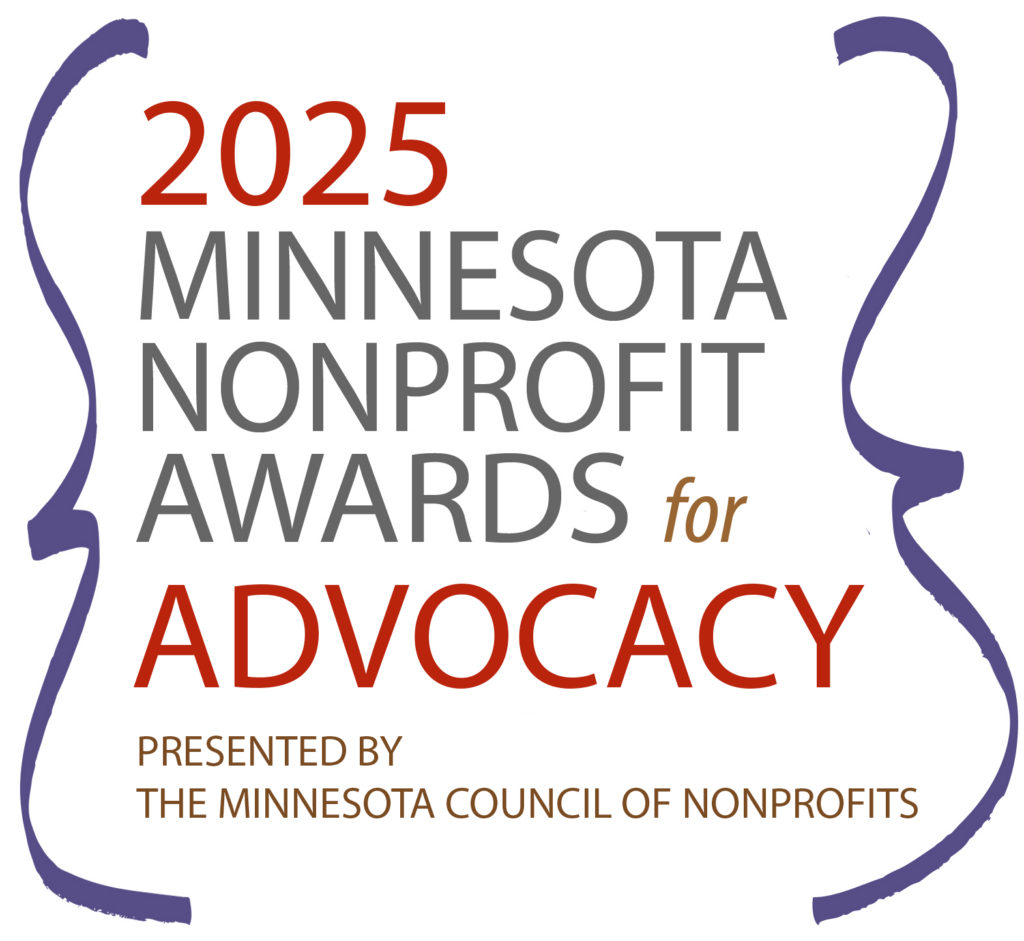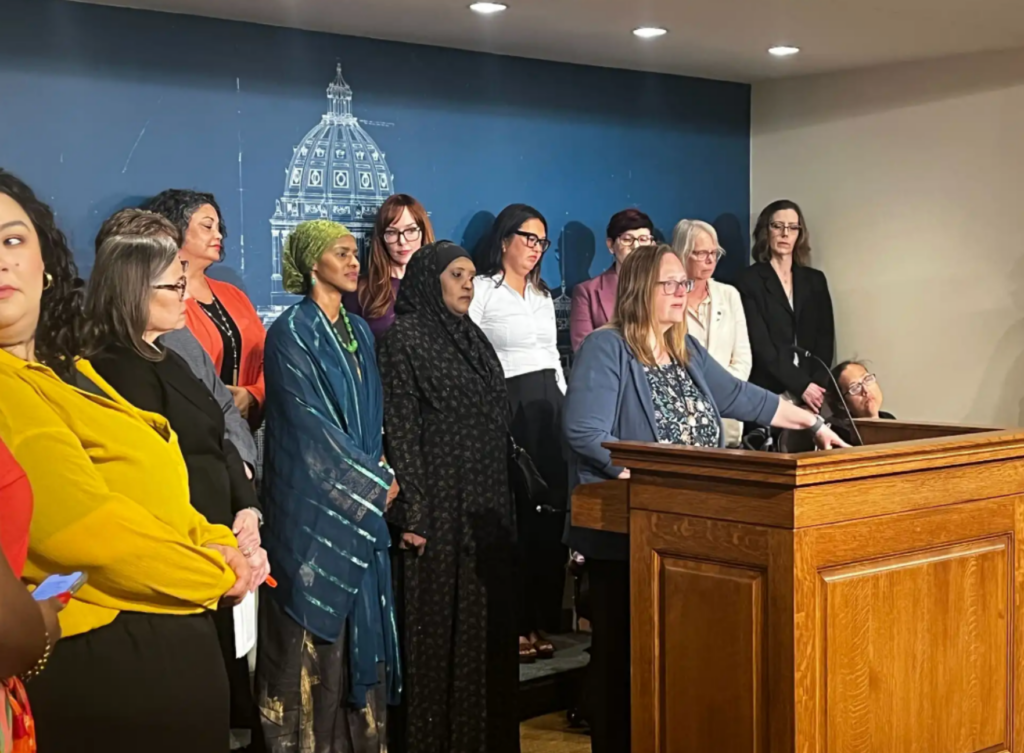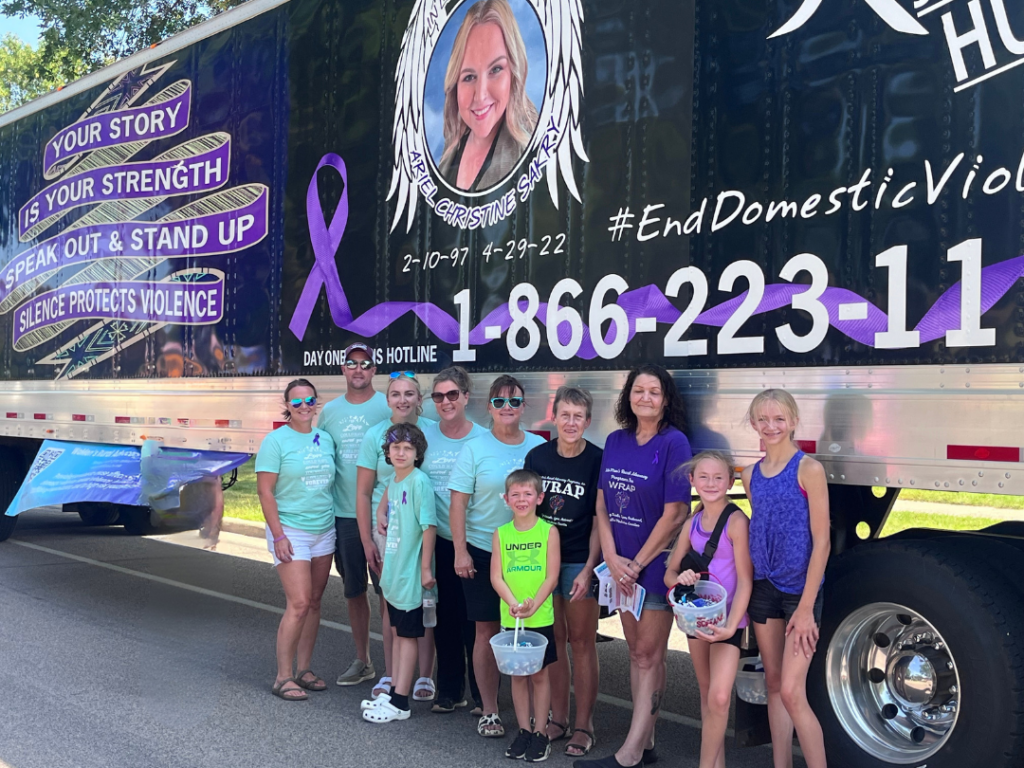
This Mission Award for Advocacy recognizes advocacy as one of the most effective and unique roles of nonprofit organizations. Nominated organizations should:
- Implement an effective advocacy strategy;
- Demonstrate success in its advocacy efforts; and
- Have a significant impact on the organization’s constituency.
Voting for the 2025 Minnesota Nonprofit Mission Awards has officially closed. Thank you for participating!
2025 Advocacy Finalists:
Native American Community Development Institute | Solutions Not Suspensions
WoMen’s Rural Advocacy Programs

Native American Community Development Institute
Founded in 2007, the Native American Community Development Institute (NACDI) believes that all American Indian people have a place, purpose, and future strengthened by sustainable community development. Based in Minneapolis, the organization serves Native people across the Twin Cities and beyond, fighting for systems that actually work for them.
From reclaiming public spaces with Indigenous art to building economic power through business development, NACDI doesn’t wait for change—it makes it. They mobilize thousands, pushing for policy shifts that center Native voices in government, urban planning, and resource distribution.
One of NACDI’s flagship efforts is the transformation of Franklin Avenue into an Indigenous Cultural Corridor—a bold, place-based advocacy initiative that redefines what urban development looks like when Native voices lead. By working directly with policymakers, city planners, and community members, NACDI has secured investments that prioritize Native businesses, public art, and spaces for cultural expression.
Beyond urban planning, NACDI is a powerhouse in policy advocacy. From housing rights to economic sovereignty, NACDI pushes for legislative changes that put Native people at the center of decisions that impact them. Whether fighting for equitable housing policies that address historic displacement or working to secure land use policies that respect Indigenous stewardship, NACDI turns advocacy into action. They mobilize community members, organize direct engagement with government officials, and refuse to let Native concerns be sidelined in political conversations.
NACDI understands that lasting change doesn’t happen in isolation. That’s why coalition-building is at the core of its advocacy efforts. Transforming Franklin Avenue into an Indigenous Cultural Corridor, for example, wasn’t just NACDI’s vision—it was a collective effort involving Native-led organizations, tribal representatives, local businesses, city officials, and grassroots activists. Through this coalition, NACDI successfully advocated for public and private investment, leading to the installation of Indigenous public art, business development grants, and infrastructure improvements that benefit Native entrepreneurs.
NACDI’s coalition work also extends to policy advocacy in housing and land rights. By partnering with organizations like the American Indian OIC and the Minnesota Indian Women’s Resource Center, NACDI has helped influence local housing policies that better address the needs of Native residents, ensuring greater access to stable and culturally appropriate housing solutions.
NACDI’s work on the Indigenous Cultural Corridor has brought tangible economic and cultural revitalization. Through advocacy and coalition-building, NACDI helped secure investments that have led to new Native-owned businesses, increased foot traffic to existing ones, and city planning decisions that prioritize Indigenous representation. Public art installations, community gathering spaces, and infrastructure improvements have reinforced the area as a hub for Native identity and economic activity.
NACDI also plays a critical role in incubating smaller grassroots organizations, providing emerging Native-led initiatives with the resources, mentorship, and strategic support needed to grow. From cultural nonprofits to economic empowerment programs, NACDI ensures that Indigenous leadership is nurtured at every level.
By combining advocacy with direct action, NACDI has helped create long-term, systemic change. Their work in economic development, housing rights, food sovereignty, and grassroots capacity-building continues to reshape the landscape for Indigenous communities in Minnesota—ensuring that Native voices are not just included but lead the way in shaping the future.

Solutions Not Suspensions
Solutions Not Suspensions (SNS) is a coalition of students, families, educators, and community organizations dedicated to ending racial disparities in school discipline and fostering positive school climates. They advocate for policies and practices that replace exclusionary discipline with restorative and non-punitive alternatives. This work includes policy advocacy, educator training, and community engagement to ensure all students — especially students of color and students with disabilities — have access to supportive learning environments.
Although students of color and Indigenous students make up just 33 percent of Minnesota’s student population, they account for 67 percent of all school dismissals. Nationally, Black, and Native youth are significantly more likely to be dismissed than white peers—but in Minnesota, the disparities are more than double the national rate, ranking the state among the worst in the country for racial discipline gaps.
SNS works statewide in Minnesota, mobilizing families, students, and educators to push for systemic change. In 2023, SNS played a leading role in passing the kindergarten through third grade dismissal ban — a historic policy designed to address these inequities by stopping the disproportionate exclusion of Minnesota’s youngest learners. SNS mobilized students, families, and educators to secure this victory, and has since worked closely with school districts, policymakers, and community partners to ensure effective implementation through restorative alternatives and supportive interventions.
Their commitment to anti-racist advocacy has not waned. In 2025, SNS is actively leading efforts to protect the hard-fought ban against renewed attempts to allow seclusion — a practice that isolates students, often as young as five, in small, locked, prison-like rooms. Despite a 2023 law banning this practice for K-3 students, a last-minute amendment in the Senate education policy bill could roll it back.
SNS has mobilized families, educators, and advocates to resist this rollback — organizing community action, elevating impacted voices, and generating broad public awareness through recent coverage on MPR, KARE11, and other media.
The strength of the SNS coalition lies in the depth, diversity, and collaboration of its members. Led by executive director Erin Sandsmark, SNS unites community organizations who share a commitment to ending racial disparities in school discipline and building inclusive school climates. Together, coalition members meet regularly to align strategies, share resources, and amplify one another’s voices—whether testifying at the Capitol, organizing press conferences, or supporting families in navigating discipline systems.
The coalition’s work has had a direct and measurable impact on Minnesota students — particularly students of color and students with disabilities — by changing how schools approach discipline. Thanks to SNS’s advocacy, more students are staying in school, maintaining access to learning, and building strong, positive relationships with educators and peers. This shift represents a fundamental transformation in how Minnesota schools support student behavior and well-being.
These outcomes are particularly significant for students of color and students with disabilities, who have historically been disciplined at disproportionate rates. By reducing the use of exclusionary practices, SNS’s work has directly addressed long-standing racial and ableist disparities. Fewer students are subjected to harmful discipline policies, and more are experiencing schools as spaces of support rather than punishment.
SNS’s efforts have ensured that more Minnesota students remain in school, connected to their education, and supported in ways that honor their potential. These changes not only improve individual outcomes but also strengthen entire school communities and move the state closer to an education system rooted in justice and inclusion.

WoMen’s Rural Advocacy Project
The Women’s Rural Advocacy Programs, Inc. (WRAP) is a nonprofit organization dedicated to empowering and supporting abuse victims in rural communities. Serving a wide geographic area, WRAP focuses on underserved rural regions, primarily the 55,000 citizens located in Lincoln, Lyon, Redwood & Yellow Medicine Counties. The geographical area served contains approximately 55,000 citizens.
WRAP’s mission is to advocate for and provide essential services to abuse victims, helping them overcome these challenges through legal support, counseling, emergency services, and educational programs. The organization goals include raising awareness about rural-specific issues, while also pushing for systemic changes to improve access to resources, legal protections, and economic opportunities for rural abuse victims.
Through their work, WRAP provides safety, advocacy, and assistance for individuals who have been victimized by domestic violence, sex trafficking, and/or exploitation. The program offers a range of services including 24-Hour Crisis Line, Safe Housing, Emergency Transportation, Court Advocacy, Safety Planning, Information Referral, Support Group, Community Education, Systems Coordination, Referral and Resources for Women of Color. The program also offers a holistic approach to healing by addressing the emotional, financial, and legal needs of residents.
WRAP’s advocacy efforts are both grassroots and policy-driven, ensuring that the voices of rural abuse victims are heard at the local, state, and national levels. The organization achieves this by providing direct services, including legal assistance, counseling, and emergency support, while simultaneously working to influence policy reforms that better address the specific needs of rural communities. WRAP’s approach is intersectional, recognizing the multiple layers of disadvantage abuse victims in rural areas face, including geographic isolation, limited access to resources, and cultural barriers.
One of WRAP’s most impactful initiatives is its public education campaigns, which aim to break the silence around issues like domestic violence in rural areas. Through partnerships with local organizations, schools, and community leaders, WRAP raises awareness and fosters open dialogue, reducing stigma and encouraging individuals to seek help when needed. The organization’s advocacy work is also reflected in its efforts to change public policy. WRAP actively advocates for legislation that improves access to healthcare, strengthens legal protections for rural abuse victims, and ensures equal economic opportunities.
Moreover, WRAP’s dedication to ensuring that rural abuse victims have a seat at the table in policy discussions is evident through its leadership in state and national coalitions that work toward social justice. The organization not only advocates for systemic change but also empowers abuse victims to become advocates themselves, providing them with the tools and support needed to lead change in their own communities.
Located in a rural area where resources are limited, WRAP provides essential services to abuse victims that would otherwise be unavailable. Their work has been a game-changer, offering not just immediate relief, but long-term support and empowerment for survivors of domestic abuse, sexual assault, and economic hardship. Through their advocacy, legal assistance, and counseling, they’ve provided women the tools they need to escape unsafe situations. I’ve seen many abuse victims who once felt trapped, regain control of their lives and start anew, knowing that WRAP is there for support every step of the way.
The ripple effect of WRAP’s services extends beyond abuse victims directly impacted. Their advocacy efforts have led to systemic changes that are improving the quality of life for families in our county. By addressing root causes like economic insecurity and lack of access to legal protections, the organization is helping create a safer, more supportive environment for everyone.